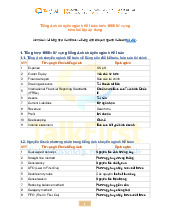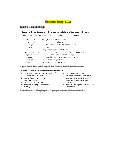





Preview text:
One of the most serious problems making many governments in the world worried
is the environmental issue, especially air pollution. Moreover, Vietnam is one of
countries, where has to endure the most serious effects as a result of the
contamination of air. Air pollution can result from both human and natural actions.
However, human activity is causing the environment to pollute in a number of
ways. Nowadays, a great number of people die because of asthma and breathing
problems in Vietnam. On the contrary, air pollution is main reason about more and
more warming of the world. Therefore, we have many ways to prevent them and
protect our life. We should stop our actions and think about environment in the future.
Firstly, everyone must reduce carbon emissions. So we need to reduce the use of
gas, oil and other fossil fuels. Alternative energy or green energy like solar energy,
hydroelectric power and wind power should be used more extensively.
Secondly, citizens should be provided with guidelines on caring for health,
particularly wearing masks on a daily basis, rinsing noses and gargle with salt
water after being exposed to exhaust emitted from vehicles’fumes.
The most important thing to reduce pollution in our city is to create public
awareness. We are mostly creating that pollution and endangering ourselves, the
Earth and other species. Without our awareness and strict determination to prevent
our city from pollution, we can’t reduce or prevent it.
In colusion, we can save our planet only through our circumspection.
UNIT 12: IELTS Speaking topic Environment
Một số từ vựng căn bản
acid rain: rain which contains large amounts of harmful chemicals as a
result of burning substances such as coal and oil.
biodegradable: able to decay naturally and harmlessly.
Biodegradablepackaginghelpstolimittheamountofharmfulchemicals
releasedintotheatmosphere.
Biodiversity: the number and variety of plant and animal species that exist
in a particular environmental area or in the world generally, or the problem
of preserving and protecting this.
A new National Biological Survey to protect species habitat and biodiversity.
carbon monoxide: the poisonous gas formed by the burning of carbon,
especially in the form of car fuel.
carbon dioxide: the gas formed when carbon is burned, or when people or animals breathe out.
Climate: the general weather conditions usually found in a particular place.
TheMediterraneanclimateisgoodforgrowingcitrusfruitsandgrapes. climate change
Therehasbeenagrowingconcernaboutclimatechange.
Deforestation: the cutting down of trees in a large area; the destruction of forests by people.
Deforestationisdestroyinglargeareasoftropicalrainforest.
desertification: the process by which land changes into desert.
disposable products: describes an item that is intended to be thrown away after use.
drought: a long period when there is little or no rain.
Thisyear(a)severedroughthasruinedthecrops.
earthquake: a sudden violent movement of the Earth's surface, sometimes causing great damage.
endangered species: endangered birds/plants/species animals or plants
which may soon not exist because there are very few now alive.
energy: the power from something such as electricity or oil, which can do
work, such as providing light and heat. There are different types of energy:
solar, nuclear, hydroelectric...
Theenergygeneratedbythewindmilldrivesallthedrainagepumps.
energy conservation: the process of conserving energy
environment: the air, water and land in or on which people, animals and plants live.
Certainchemicalshavebeenbannedbecauseoftheirdamagingeffecton theenvironment.
Extinction: Many species of plants and animals are in danger of/threatened
with extinction (= being destroyed so that they no longer exist)
Flood: a large amount of water covering an area that is usually dry.
Fumes: strong, unpleasant and sometimes dangerous gas or smoke.
Petrolfumesalwaysmakemefeelill.
natural resources: things such as minerals, forests, coal, etc. which exist in
a place and can be used by people.
Somenaturalresources,suchasnaturalgasandfossilfuel,cannotbe replaced.
global warming: 1a gradual increase in world temperatures caused by
polluting gases such as carbon dioxide which are collecting in the air around
the Earth and preventing heat escaping into space.
greenhouse effect: an increase in the amount of carbon dioxide and other
gases in the atmosphere which is believed to be the cause of a gradual
warming of the surface of the Earth.
green peace: an organization that fights for the protection of the environment.
renewable energy: describes a form of energy that can be produced as quickly as it is used.
ozone layer: a layer of air high above the Earth, which contains a lot of
ozone, and which prevents harmful ultraviolet light from the sun from reaching the Earth.
Scientistsbelievethatthereisaholeintheozonelayer.
Pollution: damage caused to water, air.... by harmful substances or waste.
recycle waste: to collect and treat rubbish to produce useful materials which can be used again.
sustainable development: a development that is causing little or no damage
to the environment and therefore able to continue for a long time.
Tsunami: an extremely large wave caused by movement of the earth under
the sea, often caused by an earthquake (= when the Earth shakes)
man-made disaster: widespread damage or loss of life brought about by the action of humans
natural disaster: an event such as an earthquake, flood or hurricane which
causes widespread damage or loss of life
natural environment: the place where animals and plants would normally be found in nature
Một số từ vựng nâng cao
to become extinct: to no longer exist
to be under threat: to be in danger of becoming extinct
to die out: see ‘to become extinct’
energy conservation: the careful management of energy resources to ensure they last as long as possible
environmentally friendly: behaviour and products that do not harm the environment
exhaust fumes: the toxic gases given off by vehicles powered by petrol
future generations: the people who live after us
to get back to nature: to live a life that is closer to nature
humanitarian aid: the act of showing support to people struggling to survive impact on: the effect on
loss of habitat: the decline in areas of land where animals and plants would normally exist
the natural world: the world of nature
poaching: to hunt and kill wild animals illegally
pollution levels: the amount of toxic waste
pressure group: a group of people who try to raise awareness of issues and
try to affect the views and actions of people and organisations
wildlife conservation: to protect animals and plants and their habitats
regrettable: something that you are sorry about and wish that it had not happened.
exhaust emissions: waste gases that come out of a car or other vehicle.
contaminate: make a place or thing dirty, by adding a substance that is dangerous or polluting.
discharge: when somebody discharges a gas or liquid, they release it and it
goes into the water or the air. aquatic: living in water
life-threatening: likely to kill someone.
cutting down on: reducing the size, amount or number of something.
awareness: knowing that something exists and is important.



